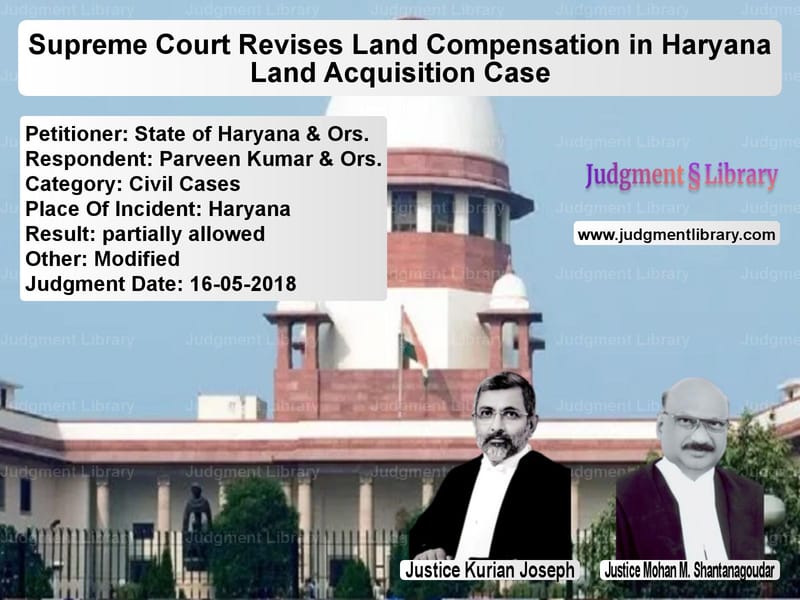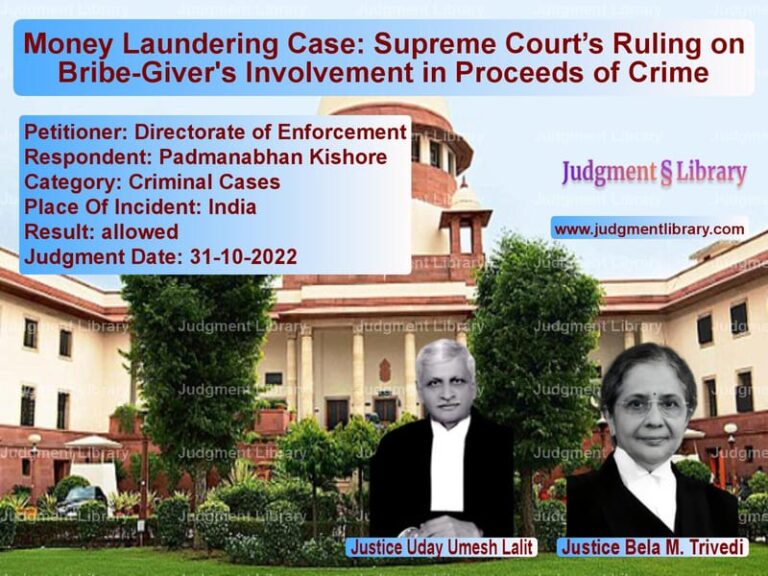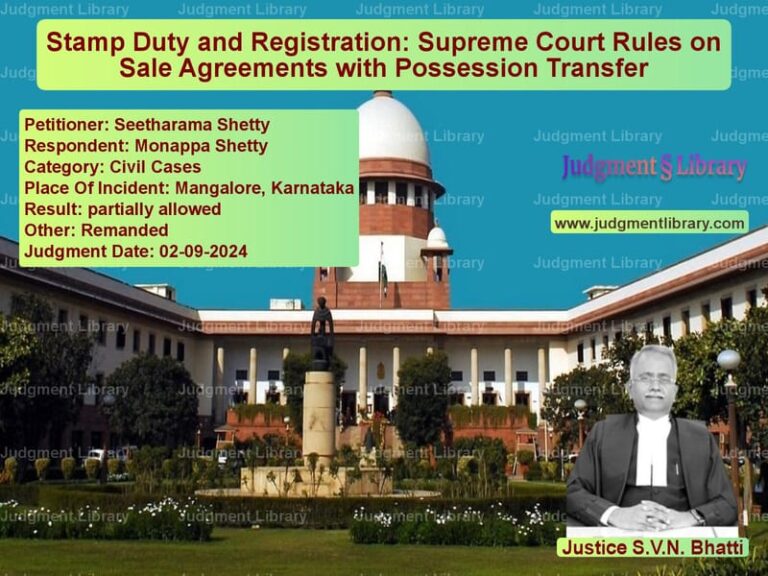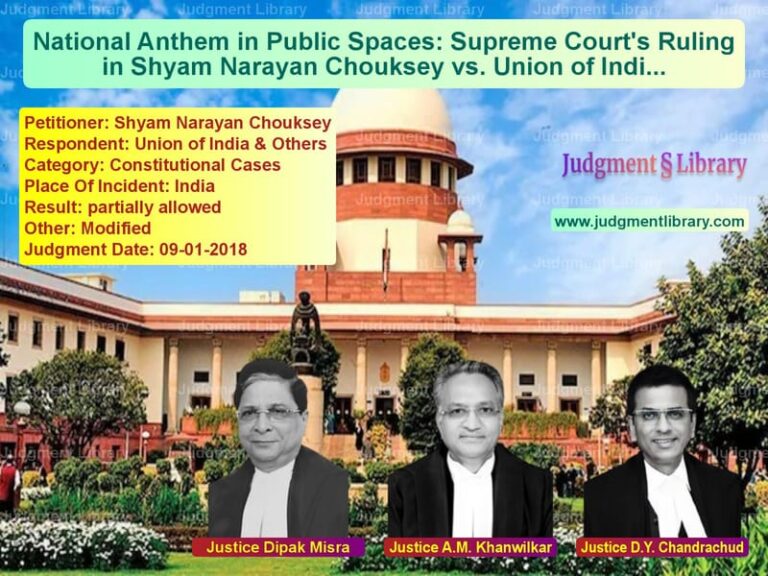Supreme Court Revises Land Compensation in Haryana Land Acquisition Case
The case of State of Haryana & Ors. vs. Parveen Kumar & Ors. is a significant judgment concerning land acquisition and compensation. The Supreme Court was tasked with determining whether the compensation amount awarded by the Punjab and Haryana High Court was excessive and if a revision was necessary.
Land acquisition has always been a contentious issue in India, often leading to disputes between landowners and the state authorities. The central question in this case was whether the compensation granted to landowners was fair and aligned with market conditions. The Supreme Court, after reviewing the facts and legal arguments, revised the compensation to Rs. 95 lakhs per acre instead of the previously determined Rs. 1.46 crores per acre.
Background of the Case
The dispute arose when the Haryana Government acquired land for a public purpose. The affected landowners were dissatisfied with the compensation initially awarded to them and sought an enhancement. The case saw multiple levels of litigation before reaching the Supreme Court.
The key facts of the case include:
- The Punjab and Haryana High Court had previously enhanced the compensation per acre significantly, setting it at Rs. 1.46 crores per acre.
- The State of Haryana challenged this decision, arguing that the enhancement was excessive and not backed by proper valuation.
- The Supreme Court had ruled on similar land acquisition cases before, fixing the compensation at Rs. 95 lakhs per acre.
- The appellants, seeking parity with previous cases, requested the Court to reconsider the valuation.
Key Legal Issues Considered
The Supreme Court examined the following legal questions:
- Whether the compensation rate determined by the High Court was justified.
- Whether the enhancement was based on a proper assessment of market trends.
- Whether a further deduction was necessary to account for developmental costs.
- Whether the compensation should be aligned with previous rulings on similar land acquisitions.
Arguments of the Parties
Petitioner’s (State of Haryana) Arguments
The State of Haryana, in its appeal, argued:
- The compensation amount of Rs. 1.46 crores per acre, as awarded by the High Court, was unreasonably high.
- The increase in compensation lacked a clear justification and was not supported by a proper valuation report.
- The Supreme Court had previously ruled on similar cases and had fixed compensation at Rs. 95 lakhs per acre, which should be considered as a precedent.
- The High Court failed to consider the need for developmental deductions in its award.
Respondent’s (Parveen Kumar & Ors.) Arguments
The landowners countered:
- The compensation amount should be based on current market trends and land valuation practices.
- The land was acquired for development purposes, and its value should be assessed accordingly.
- The landowners were entitled to a higher compensation rate as determined by the High Court.
- The reduction in compensation would unfairly disadvantage them, considering the potential future value of the land.
Supreme Court’s Ruling
After hearing the arguments from both sides, the Supreme Court ruled in favor of revising the compensation. The Court held:
“Thus the compensation that we award comes to Rs. 95 lakhs per acre, not Rs. 1,46,09,000/- as determined by the High Court.”
The Court made the following key observations:
- The compensation should be consistent with prior rulings in similar land acquisition cases.
- Based on previous case law, the reasonable compensation amount should be around Rs. 1.10 crores per acre.
- However, after accounting for development-related deductions, a fair compensation amount was set at Rs. 95 lakhs per acre.
- The High Court’s determination lacked a comprehensive assessment of comparable sales and development costs.
Key Takeaways from the Judgment
- The Supreme Court reaffirmed that compensation in land acquisition cases should align with previous rulings for consistency.
- The ruling prevents excessive awards that may not align with actual market conditions.
- Landowners receive a fair but justifiable compensation amount, balancing their rights with the state’s development needs.
- State authorities must provide clear and detailed valuation justifications when challenging compensation enhancements.
Implications of the Judgment
The judgment sets a precedent for future land acquisition cases, ensuring that:
- Land compensation determinations are based on clear and consistent valuation practices.
- Landowners receive a fair settlement that accounts for market value and development-related costs.
- State authorities are held accountable for providing appropriate compensation rather than arbitrary assessments.
In previous cases, inconsistent compensation awards have led to protracted litigation and dissatisfaction among landowners. This ruling helps streamline the process by establishing a reasonable benchmark for similar cases.
Comparative Analysis with Previous Cases
The Supreme Court has previously ruled on multiple land acquisition disputes, with compensation varying depending on the region and land usage. The Rs. 95 lakhs per acre benchmark aligns with prior rulings, creating a standardized approach to land valuation.
For instance:
- In another Haryana land acquisition case, the Court had set the compensation at Rs. 95 lakhs per acre, ensuring consistency.
- In similar cases in Punjab and Uttar Pradesh, compensation has ranged between Rs. 85 lakhs to Rs. 1 crore per acre, depending on infrastructure development potential.
By following this approach, the Court aims to prevent excessive or arbitrary enhancements that may create discrepancies in land acquisition compensation.
Conclusion
The Supreme Court’s ruling in this case is a crucial step toward ensuring fair and reasonable compensation for landowners in acquisition cases. While the judgment reduces the amount awarded by the High Court, it maintains a balance between landowner rights and state development needs.
This ruling will serve as a guiding principle for future land acquisition disputes, emphasizing the need for fair valuation, consistency with previous cases, and the application of reasonable development deductions.
Petitioner Name: State of Haryana & Ors..Respondent Name: Parveen Kumar & Ors..Judgment By: Justice Kurian Joseph, Justice Mohan M. Shantanagoudar.Place Of Incident: Haryana.Judgment Date: 16-05-2018.
Don’t miss out on the full details! Download the complete judgment in PDF format below and gain valuable insights instantly!
Download Judgment: State of Haryana & O vs Parveen Kumar & Ors. Supreme Court of India Judgment Dated 16-05-2018.pdf
Direct Downlaod Judgment: Direct downlaod this Judgment
See all petitions in Landlord-Tenant Disputes
See all petitions in Damages and Compensation
See all petitions in Property Disputes
See all petitions in Judgment by Kurian Joseph
See all petitions in Judgment by Mohan M. Shantanagoudar
See all petitions in partially allowed
See all petitions in Modified
See all petitions in supreme court of India judgments May 2018
See all petitions in 2018 judgments
See all posts in Civil Cases Category
See all allowed petitions in Civil Cases Category
See all Dismissed petitions in Civil Cases Category
See all partially allowed petitions in Civil Cases Category







